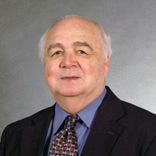
Long-time Criminal Justice Professor to Retire after 45 years of Making History
After 45 years of loyal service, Dr. Raymond Teske will be stepping away from the classroom this summer, leaving behind a legacy of knowledge and dedication passed on semester after semester. Although he still does not feel ready to step away, he knows its time. He has plans to dedicate more time to research and travel.By: Veronica Gonzalez/vgonzalez@shsu.edu
After 45 years of loyal service, Dr. Raymond Teske will be stepping away from the classroom this summer, leaving behind a legacy of knowledge and dedication passed on semester after semester. Although he still does not feel ready to step away, he knows its time. He has plans to dedicate more time to research and travel.
“I truly do not want to retire from the classroom. I enjoy the students. I enjoy being around my colleagues,” he said.
His inspiration to teach all these years can be summed up in one word – “fun,” as he reminisced about his time here. Teske has thoroughly enjoyed watching generations of students come through his courses and go on to impact the surrounding communities.
Dr. Teske has been a member of the faculty at Sam Houston State University since 1973. In that time, he has seen, and helped develop, the Institute of Contemporary Corrections and the Behavioral Sciences into what we now know as the College of Criminal Justice.
Teske’s original career plans didn’t include coming to SHSU at first. He planned to join the Navy, but those plans did not materialize. In that timeframe, he also married and completed his master’s in Sociology at Baylor University. He turned his attention to the FBI after that and signed a three-year contract with them. He would fulfill his commitment after completing his Ph.D. at Texas A&M University, but a government hiring freeze prevented him from attempting to move on with the FBI.
Dr. Teske’s acquaintance with George J. Beto started at their church in Waco when Teske was 12. Since then, he followed Beto’s career and gave SHSU a chance. Teske called George G. Killinger, the college’s first dean, and had an appointment with him the next day. Since then, he has been a tremendous part of developing a majority of the criminal justice, criminology, and victim studies programming now offered.
His areas of expertise include criminological theory, victimology, family violence and child abuse. In addition to editing and co-authoring two editions of Crime and Justice in Texas, Teske has published more than 40 articles and book chapters, 25 monographs/technical reports, and has been awarded more than 40 research grants. He has been an Alexander von Humboldt Foundation Fellow since 1980.
After spending time in Germany in 1980 designing and implementing the first large-scale crime victim survey through the Alexander von Humboldt Foundation, Teske returned realizing that there was something missing in criminal justice education.
“We did not address the crime victim. That was virgin territory,” he said.
In 1982, he established the first regularly offered victimology course in America. Two of his doctoral students went on to help write the first two textbooks. From there, he was invited to be an advisor for the Parents of Murdered Children chapter in Houston and become involved in Justice for All.
Teske was also instrumental in helping found the SAAFE House in Huntsville in 1985, only 7 years after the first family violence shelter opened in the USA.
“I was immersed in helping victims at a time there were limited resources,” he said. “In 1985, I testified before the Texas Legislature in the hearing that recommended the first crime victims’ bill of rights in Texas.
“In 1998-2000 I worked to start the victim studies degree,” he explained. “That was a novel idea and I worked day and night, weekends, and holidays chairing a university-wide committee putting the courses and degree together.”
PEACE OFFICER TESKE
In 1979, Teske’s students talked him into becoming a peace officer.
“They told me I needed to get out and find out what the real world is like. They were right. And I am still a peace officer,” he shared.
He worked with Huntsville Police Department, the Texas Department of Public Safety, the Walker County Sheriff’s Office, and other agencies including Montgomery County.
“At one point the Federal Postal Inspection Service approached me and asked if they could train me to work undercover child pornography cases,” he said. “I did that for two years working with agents across the country.”
He also served as an expert witness or a consultant in cases involving child sexual abuse, police use of force, battered women, police cost analysis, and other cases.
CURRENT PROJECTS
His most recent research includes the deterrent effect of executions on homicides and spatial analysis of crime rates in the former west and east German states, but the research near and dear to his heart at the moment is his father’s cavalry squadron.
Dr. Teske believes he could go on with lectures for at least five more years, but doesn’t want to miss the chance to finish organizing his father’s story and years of genealogical research.
“I have been researching my father’s cavalry squadron for many years. I have his memoirs, the stories he told me, photos, every single radio log transcribed during the war, minute-by-minute, for both squadrons and group headquarters, after-action reports, morning reports, the 1:25000 maps they used, stories from veterans, and a lot of other material,” he said. “I need to organize all of this for the next generation before it is lost.”